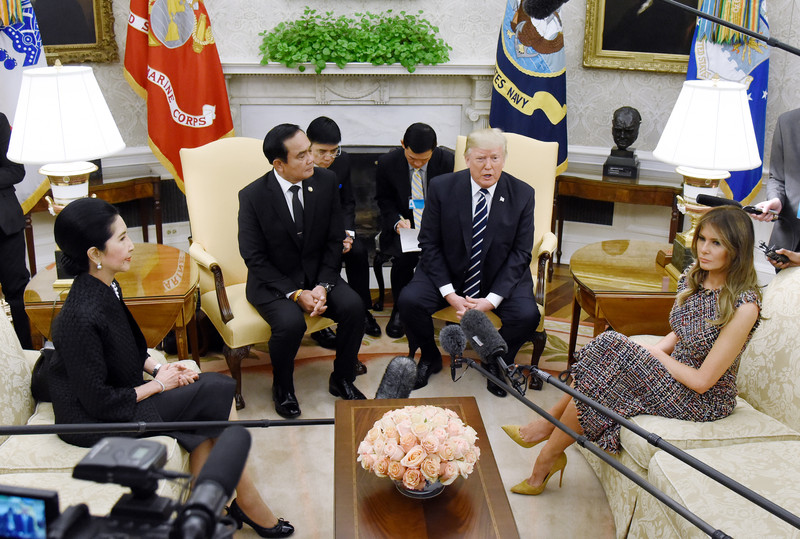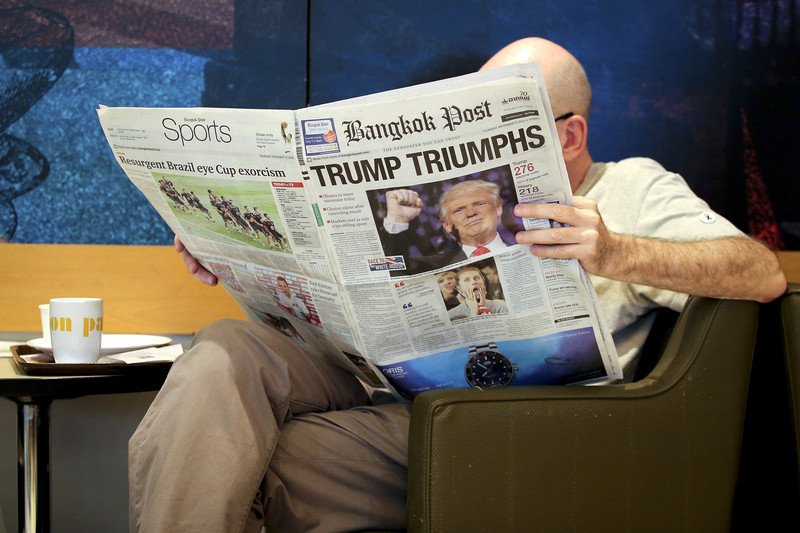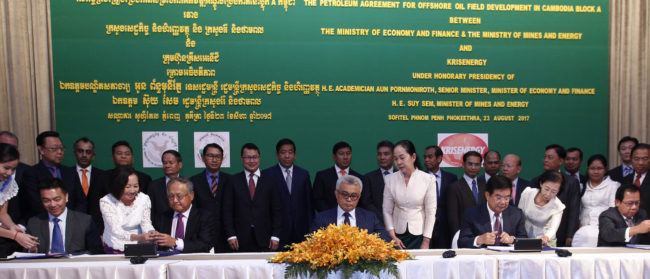The United States will soon have new leadership, as Congress will meet on January 6 to formally count the votes of the Electoral College. Absent a highly unlikely and very undemocratic coup d’état – an authoritarian fantasy largely present in the mind of outgoing President Donald Trump – the joint session will solidify President-elect Joseph Biden’s victory and his inevitable inauguration on January 20.
Trump’s imminent departure from the Oval Office will be felt in Southeast Asia, his legacy largely divided among ASEAN member states. In Thailand, the Trump record should be judged as four years of missed opportunities and political missteps.
There have been many assessments already filed by numerous commentators on this subject, with some suggesting that under Trump, the US relationship with Thailand has improved – in stark contrast to former US Secretary of State John Kerry’s blunt assessment after the May 2014 coup that there would be “negative implications” for bilateral relations between the countries. And in conjunction with American law, foreign aid flow abruptly stopped.
Trump’s arrival in January of 2017 did not necessarily make relations better, rather it simply redefined the boundaries of the bilateral relationship. During Thai Prime Minister Prayut Chan-o-cha’s October 2017 meeting with Trump, a “transactional” approach was developed, as the Trump Administration sought to rebalance traditional trade relationships with Asian counterparts and draw distinct contrasts with China.
While the first Trump-Prayut meeting resulted in a joint statement that reiterated the “special relationship” between the two countries in the context of the wider Indo-Pacific, it also resulted in the quick erosion of the values-oriented foreign policy of the Obama Administration, which was less inclined to turn a blind eye to human rights abuses by the military-backed regime.
Commentators who have argued that Thailand’s relationship with the US has improved neglect to connect the relationship to a strategic national interest or value. Improved in relation to international human rights norms and standards? No. Improved with regard to US interests in furthering Thai democratisation? Still no, and the presence of elections in 2019 does not constitute democratisation. The relationship only improved if Trump was appeased by Thailand’s early interest in transactional diplomacy.

Trump’s early interest in Thailand was motivated by two issues. While the initial invitation might have seemed to have been motivated by mutual goals in facilitating increased bilateral trade, it was more an attempt to contain the North Korean nuclear threat, particularly after the US Special Representative for North Korea Joseph Yun urged Thailand to downgrade its relationship with Pyongyang. Then US Secretary of State Rex Tillerson had been pressuring Prayut to crack down on North Korean front companies that were headquartered in Bangkok and to support a United Nations resolution issuing sanctions on North Korea over nuclear tests.
The second, but far more distant draw, was Trump’s interest in Thailand’s then-$18 billion trade deficit with the US. Prayut made token efforts to buy aircraft from Boeing via Thai Airways, or the commitment of Siam Cement to buy 155,000 tonnes of coal from the US for its cement plants. Of course, none of Thailand’s token efforts to appease Trump did much to close the trade gap. The trade deficit, as of 2019, stands at $20.1 billion.
It stands to reason how the relationship improved via transactional diplomacy, with Trump later suspending duty-free privileges on $817 million worth of Thai imports to American markets. The major upside for Thailand, despite the consequences on trade, was the opportunity for legitimation for junta leaders. With American easing pressure off of democratisation, Thailand’s relations with the US had become normalised in a matter of months.
In so doing, the Americans and its allies made critical errors. While the US and the European Union had pressed neighbouring Cambodia for its democratic backsliding and plunge into one-state autocracy, both paid little attention to Thailand, who manipulated the backdrop for the referendum on latest constitution, altered the composition of the Parliament, banned opposition political parties, and manipulated the results of the March 2019 election.
Ahead of the election, the EU eased sanctions on Thailand because of its adoption of the 2017 constitution and announcing the date for elections. The US meanwhile, maintained a guarded approach, congratulating the Thai people on their participation in the election process, and “calling for the expeditious announcement of voting results and a fair and transparent investigation of any reported irregularities”.
The American relationship with Thailand has always been one of geopolitical significance, and Thailand has always found itself ‘bending with the wind’ to balance political relationships with both the US and China
Later under Secretary of State Mike Pompeo, Washington declared that Thailand had a “democratically elected government” – a key announcement in the slow, but steady normalisation of military ties between the two governments. This was the clearest example of the administration’s attempts to refocus engagements with the Thai regime from democratisation to one of security.
First, around the time of Pompeo’s announcement, the American military announced that Thailand had agreed to spend $175 million to buy 60 Stryker armoured infantry carriers. In September of 2019, the US had agreed to sell Thailand eight AH-6i light attack reconnaissance helicopters for $400 million.
Because of American vacillation, Thailand had learned that international pressure could be either ignored or easily managed. Even while the US State Department had internally opposed moves that would classify Thailand as anything other than an authoritarian regime, the US chargé d’affaires Peter Haymond in a July 4, 2019 speech noted that “the United States looks forward to working with Thailand’s newly elected Parliament and newly seated government”. Democracy and human rights again took a backseat to regional security and the arms trade.

The American relationship with Thailand has always been one of geopolitical significance, and Thailand has always found itself “bending with the wind” to balance political relationships with both the US and China.
American willingness to resume the normalisation of security ties came as China’s defence ties with Thailand have grown. China has easily filled the vacuum left by the American absence and has supported other regimes in their separation from the West, as evidenced in Phnom Penh. However, American democratisation pressure in Southeast Asia has come only where pressure is least likely to succeed. Paltry efforts for nations to resist China are at best half-hearted efforts to force autocrats to capitulate. Whereas the Obama Administration likely overstepped Thai sensitivities with regard to the 2014 coup, the Trump Administration had no response at all, with normalisation the only priority.
Thai sensitivities to foreign interference and lecturing are well known, but that does not mean that pressure should not be applied. The US should have stayed its course during bilateral meetings and multilateral engagements with ASEAN reiterating support for democratic values and respect for human rights. Public forms of diplomacy should have been strongly considered, as was demonstrated during the Ambassadorship of Kristie A. Kenney, who set a high bar for Thai language outreach on social media and traditional channels.
In the grand scheme of things, the Trump Administration failed to reach out bilaterally on issues of far greater importance than security, such as the environment. Issues governing the management of the Mekong River will inevitably complicate Sino-Thai relations and Thailand’s unique geography provides some leverage. Helping Thailand manage its relations with China, using Thai culture rather than traditional American pressure, is a smarter approach.
But these are sensibilities that the Trump Administration seemed to care little about, as evidenced by the 2019 East Asian Summit and the US-ASEAN Summit, which were both held in Bangkok. Trump’s lack of attention was on display, sending a “downgraded” delegation to both. ASEAN leaders responded by snubbing the US-ASEAN event.
The past four years of US-Thai relations have benefited only a select few. Trump managed to normalise and legitimise a government without public legitimacy and started a zero-sum, relative approach to trade that has rippled across the region.
It goes without saying that American policy toward Thailand under the Biden administration will change. The President-elect can get a headstart on policy reversal by absorbing the lessons of the many missteps of his vanquished political rival and adapt American policy accordingly.
Mark S. Cogan is an Associate Professor of Peace and Conflict Studies at Kansai Gaidai University in Osaka, Japan. He is a former communications specialist with the United Nations in Southeast Asia, Sub-Saharan Africa, and the Middle East.


